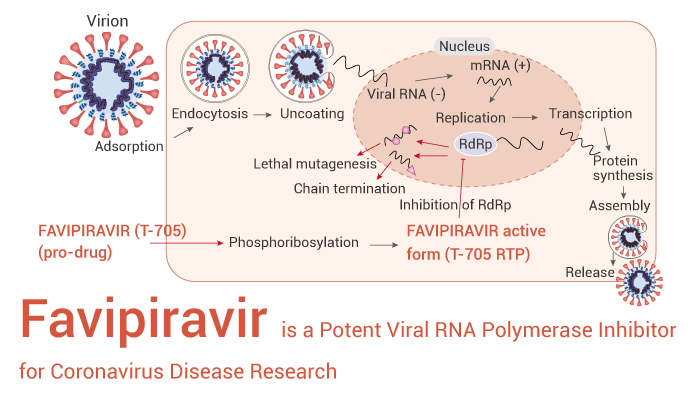Favipiravir (T-705), a purine nucleic acid analog, is an antiviral agent approved in Japan in 2014 for therapy of influenza virus infections. In 2020, Favipiravir also received the DCGI approval in India for mild and moderate COVID-19 infections. Favipiravir inhibits viral transcription and replication of multiple virus. For example, Favipiravir is active against all types (A, B and C) of influenza virus, drug-resistant influenza strains, Ebola virus disease (EVD) and SARS-CoV-2, etc. Specifically, Favipiravir is a competitive and selective inhibitor of RNA-dependent RNA polymerase (RdRp). It can be phosphoribosylated by cellular enzymes to its active form, Favipiravir-ribofuranosyl-5′-triphosphate (Favipiravir-RTP). As reported, Favipiravir shows significant antiviral efficacy in in vitro and in vivo animal studies.

Favipiravir, a selective inhibitor of RdRp, is a potent antiviral agent against influenza virus and COVID-19 infection.
In vitro, Favipiravir inhibits RdRP activity with an IC50 of 341 nM. Favipiravir inhibits the human DNA polymerase α, β or γ with an IC50>1 mM, and 905 μM for human RNA polymerase II. Therefore, Favipiravir is highly selective for the influenza virus RdRP. Besides, Favipiravir inhibits all types of influenza virus strains with EC50s in the range of 0.014-0.55 μg/mL, with the 50% cytotoxic concentration (CC50) of more than 2,000 μg/mL in host MDCK cells. Favipiravir also completely inhibit norovirus replication at 100 μg/mL, with little or no adverse effect on the host cell (cell viability >80%).
In vivo, Favipiravir also shows antiviral activity. Specifically, Favipiravir (p.o., 30-100 mg/kg/day, 2 or 4 times a day, for 5 days) improves survival compared to Placebo in mice infected with influenza virus H3N2 or H5N1. Moreover, Favipiravir (p.o., 20 mg/kg/day) shows synergistic effect together with Oseltamivir (p.o., 10-40 mg/kg/day) in an influenza A/Victoria/3/75 (H3N2) virus infection mouse model.
In conclusion, Favipiravir is a competitive and highly selective RdRp inhibitor. Importantly, Favipiravir shows antiviral effect in in vitro assays and in vivo animal studies. Favipiravir can be used for research of virus infections, such as influenza virus and SARS-CoV-2 infection.
Reference:
[1] Łagocka R, et al. J Clin Med. 2021 Jan 13;10(2):273.
[2] Furuta Y, et al. Antiviral Res. 2013 Nov;100(2):446-54.
[3] Smee DF, et al. Antimicrob Agents Chemother. 2010 Jan;54(1):126-33.